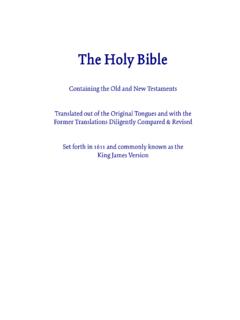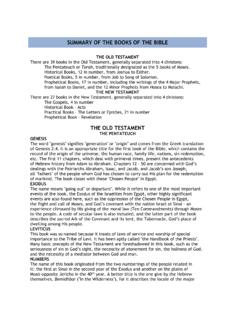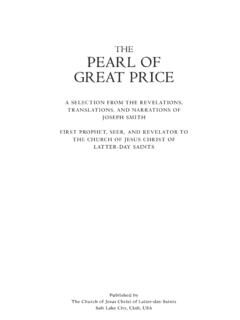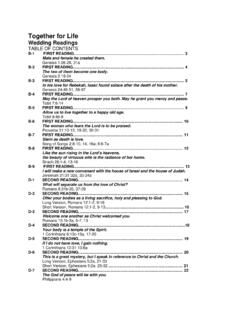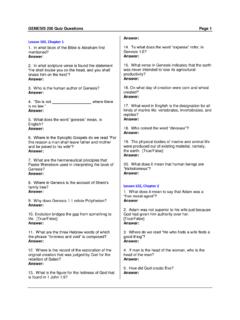Transcription of Judaism and Christianity - Northampton
1 Judaism and Christianity Judaism and Christianity are two monotheistic, ethical religions which share a part of their scriptures in common; the Bible or Tanakh of the Jews is the Old Testament of the Christians. These religions share many common beliefs: (1) there is one God, (2) mighty and (3) good, (4) the Creator, (5) who reveals His Word to man, and (6) answers prayers. Both Judaism and Christianity make (7) a positive affirmation of the world as the arena of God's activity, (8) as the place where people have an obligation to act ethically, and (9) which should be redeemed from injustice. Both believe in (10) a future life, as well as a doctrine of resurrection.
2 Finally, both look to (11) a final consummation of history and (12) the realization of God's complete sovereignty on earth, through the coming of a Messiah or, in the case of modern forms of Judaism , a Messianic age. Besides these similarities of doctrine, Christianity is bound to pay special attention to Judaism because Jesus and his disciples were Jews. They lived as Jews; the Jewish Bible was their Bible, and they criticized Jewish beliefs and practices as reformers from within. Jesus' life and teachings are largely incomprehensible without an understanding of Judaism of his time. Although Judaism and Christianity share many common elements in their beliefs, there are also deep differences.
3 First, for Judaism God is one and unique; for Christianity God is one in His nature but there are three persons constituting the Holy Trinity: Father, Son, and Holy Spirit. Christians believe in Jesus, called Christ, the Messiah, who is the Incarnation of the second person of the Trinity: therefore adoration is not given to man but to God who became man. Salvation for mankind is entirely the gift of God, through the sacrifice of the second person of the Trinity, who became man and suffered and died in his humanity and became alive again. Christians believe in Christ and in his passion, death, and resurrection; they follow his teachings and example; and after death they expect to share in his glorious resurrection.
4 Judaism , for its part, is no less conscious of God's grace, but it offers sanctification through membership in the Jewish people and by regarding the scriptures as teaching and enjoining a life of holiness. For Jews the Messiah has not yet come, and they still anticipate the coming of the Messiah or Messianic age. Their future hope is an earthly vision of a world of peace and justice. The Christian future hope is expressed by the doctrine of the Second Coming of Christ, when evil will finally come to an end and the spiritual blessings already accomplished in Jesus Christ will be manifested substantially in the Kingdom of Heaven. Both Judaism and Christianity no longer practice the scriptural laws of animal sacrifices.
5 But while for Judaism the mitzvot, the ethical and ritual commandments of the Bible, remain normative, and are elaborated in the Talmud as the halakah or requirements of life, Christianity has regard only for the Bible's ethical , the Ten Commandments. Christianity emphasizes faith in Jesus Christ, who gives grace, empowerment, and guidance for living the moral life.[2] Judaism teaches a life of holiness through performing mitzvot and emphasizes the importance of adhering to the Bible's standards of social justice as laid down by the Prophets. The two religions have also diverged on the meaning of the Fall of Man; Christianity affirms a doctrine of Original Sin which is not emphasized in Judaism .
6 These deep differences extend to the way Judaism and Christianity regard their sacred writings. Judaism regards its sacred books as the complete source for all the teachings which God requires of his people for their welfare. For Christianity , the sacred books of Judaism , called the Old Testament, are taken as a preparation for the final revelation that God would make through Christ--a revelation that is written in the books of the New Testament. Judaism 's Bible or Tanakh is made up of the Law (Torah), the Prophets (Nebi'im), and the Writings (Ketuvim); its books were written over a period of more than thirteen hundred years of Jewish history, from the time of Moses until several centuries before the common era.
7 The center of this scripture is the Torah, the Five Books of Moses. The book of genesis contains stories of creation, the Fall of Man, and the lives of the patriarchs Noah, Abraham, Isaac, Jacob, and Joseph. Exodus, Leviticus, Numbers, and Deuteronomy recount the Jews' liberation from slavery in Egypt and the revealing of the Law to Moses on Mount Sinai. The Prophets include the books of Joshua, Judges, Samuel, and Kings recounting the history of Israel in the days when it was guided by its prophets, and Isaiah, Jeremiah, Ezekiel, Amos, Hosea, Micah, Habakkuk, Jonah, Haggai, Zechariah, Malachi, etc., which record the words of individual prophets. Among the Writings are the book of Psalms containing prayers and hymns; Proverbs, Ecclesiastes, and Job containing wise sayings, discourses on wisdom, and meditations on the human condition; Lamentations mourning the destruction of the Temple; Song of Songs, where love poetry has long been interpreted as describing the mystical relationship between God and Israel or God and man; and Daniel with its stories of faith in the midst of persecution.
8 In addition to the Tanakh, a tradition of Oral Torah, passed down to the rabbis of the first several centuries of the common era and codified in the Talmud, which is constituted by the Mishnah and the Gemara, is authoritative for the observant Jew. One may regard the role of Talmud and Midrash--early rabbinic interpretation of scripture--as providing the interpretative perspective for a proper understanding of the Bible. While much of the Talmud and Midrash is devoted to discussions and codifications of law, they also contain passages of universal spiritual and ethical wisdom. The best known collection of the latter is a small tractate of the Mishnah called the Abot or Sayings of the Fathers.
9 [3] Beyond the Talmud and Midrash, Jewish tradition also hallows the books of statutory prayers. The mystical treatise called the Zohar and several other works together constitute the Kabbalah or mystical tradition which has canonical status for many Jews. A number of theological works, notably The Guide for the Perplexed by Moses Maimonides (1135-1204) and Shulhan Arukh by Joseph Caro (16th century) are also held in the highest regard. The Christian Bible includes the Old and New Testaments. The Old Testament was the scripture of Jesus and his followers who were themselves Jews. It is identical to the Jewish Bible but with its books in a different order. Christians emphasize the prophetic books above all other parts of the Old Testament, for they are seen to announce the advent of Jesus Christ.
10 Roman Catholic and Orthodox Bibles include a number of additional books, called deutero-canonical books, in the Old Testament. Notable among them are the wisdom books Sirach and the Wisdom of Solomon, the stories of Tobit and Judith, and the history of the Maccabean revolt with its stories glorifying martyrdom in I-IV Maccabees. These books circulated among Jews during the last two centuries before Christ and were included in the Septuagint, the Greek translation of the scriptures. The New Testament is written in Greek; the early Christians largely spoke Greek; and they used the Septuagint as their Old Testament. But these books were not included in the canon of Hebrew scriptures as fixed by the rabbis at Jamnia in 90 At the time of the Protestant Reformation, when the Reformers returned to the Hebrew rabbinic text as their standard, they omitted these books from their vernacular translations of the , Luther's Bible and the English King James Version.






